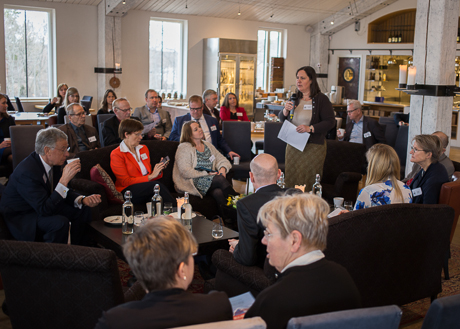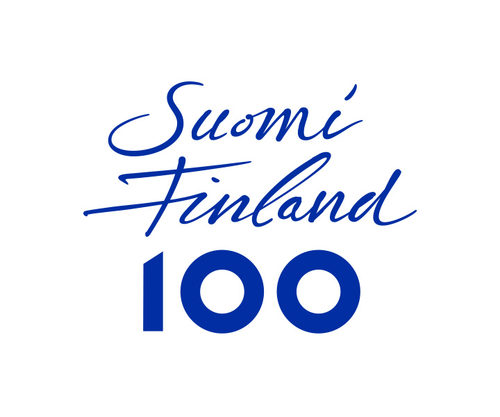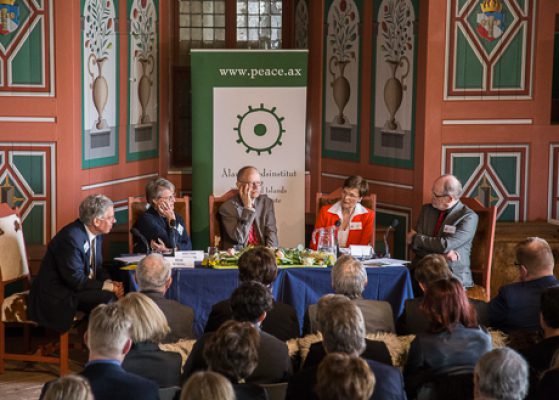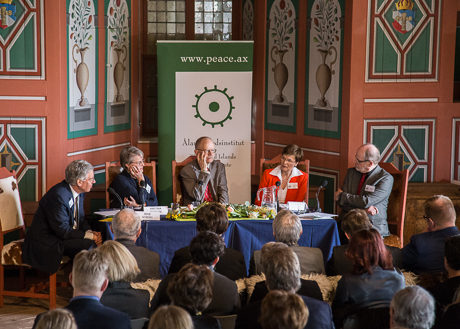The current world and globalisation also raised contradictory thoughts. Whereas Nils Petter Gleditsch noted that the number of conflicts has decreased and most of the current conflicts are intra-state, Astrid Thors reminded that the number of refugees is larger than ever before in history. Kristina Persson was worried about wealth inequality, where the richest eight people in the world own as much as half of the globe’s population. What she deemed positive in global politics, in turn, was that the Norwegian status as an observant at the next G20 meeting was positively upholding the role of the entire Norden. Nordic cooperation was appreciated also in other addresses: René Nyberg applauded for instance NORDEFCO for successful defence cooperation, especially with regard to air force exercises in the North.
{besps}/stories/Kastelholm2017/|width=460|height=307|||ctrls=1{/besps}
The debate also touched upon the role of Åland, which was similarly seen to involve both positive and challenging aspects. Kristina Persson pointed out that the smaller the society the more it is dependent on others, but as a counterbalance, smaller societies can better involve people. Astrid Thors considered that Ålanders today know Finland to a lesser extent than they did 30 years ago, and urged them to get to know Finland better. René Nyberg, in contrast, was worried about the status of the Swedish language in Finland, with yet another Prime Minister who does not speak Swedish. Nils Petter Gleditsch hoped that Åland could serve as a model for territorial disputes in the world, with its autonomy, minority rights and demilitarisation. As a conclusion to the debate, the speakers hoped that Nordic cooperation increases and openness towards the world is further strengthened.

After a coffee break, the discussion continued with a roundtable discussion at the nearby restaurant Smakbyn. In addition to the panel from the castle, three speakers were asked to share their thoughts about the theme of “neighbourness” under the moderation of Sia Spiliopoulou Åkermark, Research Director of the Åland Islands Peace Institute. The theme was discussed from a variety of perspectives, and the public could also intervene. In her opening address, Anna Abrahamsson, the Secretary General of Svensk Ungdom (Youth Organisation of the Swedish People’s Party in Finland), expressed her concern about young people not upholding democratic values, as revealed in a recent study. Janne Holmén, an Ålandic historian, argued on the basis of recent research that people in Finland’s closest neighbour, Sweden, do not know Finland well, as revealed in recent studies. Similarly to Anna Abrahamsson, he also connected the theme to democracy, considering Finland putting more emphasis on the rule of law and Sweden on democracy. The third speaker, Natalia Jerofejeva, a language pedagogue in Åland with a Russian background, pointed out the borderlessness we can observe in our neighbourhood, also building upon her own personal experience.
After the opening addresses, the public eagerly joined in the discussion, with both academic and political viewpoints. René Nyberg pointed out that legalism can also be a political strategy, whereas Astrid Thors and Kristina Persson were worried about the fear of the “other” being used as a political weapon instead of building a sense of togetherness. The discussion also varied from the lack of interest in politics among young people to the role of Russia in the world. Barbro Sundback, the Chair of the Board of Directors of the Peace Institute, brought up the role of the sea as a neighbour. For Ålanders, the sea seems to bring security, an observation she contrasted to Sicily. Indeed, for Sicilians the sea represented a threat through which the region had been invaded throughout history.
The role of Norden and Finland in the EU also came up in the debate. There was discussion whether Nordic priorities should be better upheld in the EU and whether Sweden, as a land of consensus, had had more difficulties in adapting into the European Union than the centralised Finland. With regard to the political sphere, a rising concern for the public was people not being interested in politics, whereby individualism and social media were partly to blame. The conclusion of the speakers was that knowledge is the key for successful neighbourness, which also involves not separating between “us” and “them”.
Text: Saila Heinikoski
Photo: Filip Holiencin
Kastelholm talks on peace 2017: Finland as a neighbour – boundaries and boundlessness over the past century
The Kastelholm talks of 2017 highlighted the centenary celebration of Finland, discussing the topic “With Finland as a neighbour – boundaries and boundlessness over the past century”.
The Kastelholm talks were held on 30 March 2017, the day of Åland’s demilitarisation. In a discussion ranging from the past to the present and on to the future, it was assessed how the neighbours might be viewing the developments in Finland and how Finland might view its neighbours.
When Finland gained its independence in 1917, Sweden, Russia and other countries around the Baltic Sea and in the Nordic region got a new neighbour. A little later Åland became autonomous, and hereby became an ”internal neighbour” for Finland, in a process that also engaged the surrounding world. What have the last one hundred years entailed for the neighbourhood, and what can we expect from the next century, in view of the past? What relationships and identities will Finland, Åland and their neighbours develop in a neighbourhood of transformation of a world that is becoming increasingly boundless?
The Kastelholm talks of 2017 were supported by the Government of Åland together with the foundations Svenska folkskolans vänner, Letterstedtska föreningen and the Swedish-Finnish Cultural Foundation. The Kastelholm talks of 2017 formed part of the Finnish national program for the centenary celebration of Finland.





